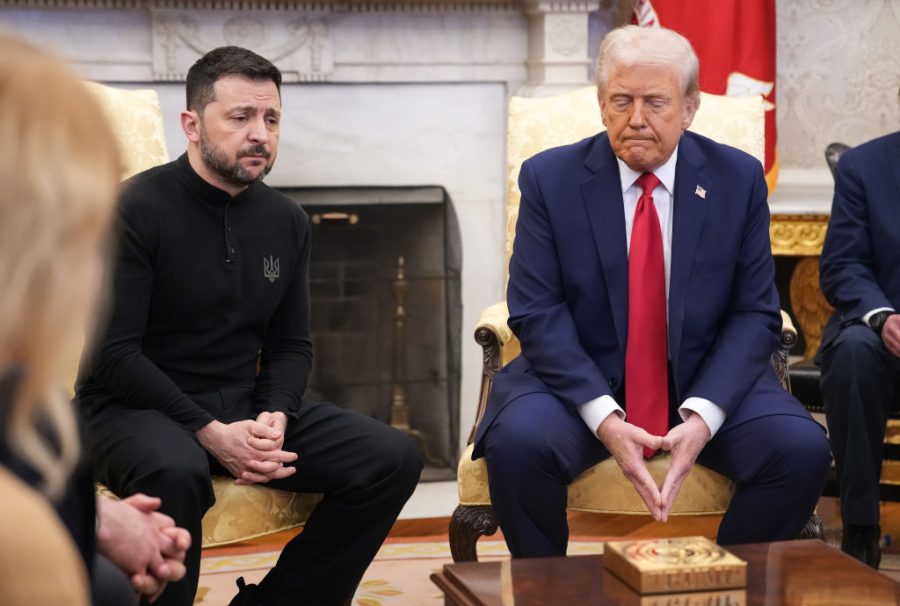It is unquestionably the case that people who should have known better were blinded by the Capri-Sun King’s glare when they reassured us that Donald Trump would not abandon Ukraine, that a second Trump administration would not really cut off military aid to Kyiv or effectively offer a free pass to Vladimir Putin. Yet that is what is happening.
Last week the US Department of Defense halted a planned delivery of air defence missiles and precision munitions to Ukraine, the third time this year that such a stoppage has been put in place. The weaponry was part of a supply programme agreed under President Biden, but was halted as the Pentagon undertakes a ‘capability review’ to assess stockpiles currently held by the United States. A spokesman explained:
It is no coincidence that Russia last week launched its biggest air strikes on Kyiv since the war started
We can’t give weapons to everybody all around the world. Part of our job is to give the President a framework that he can use to evaluate how many munitions we have and where we’re sending them. And that review process is happening right now and is ongoing.
However, the motivation behind the sudden decision, reportedly taken personally by Secretary of Defense Pete Hegseth and without coordination or consultation either within the administration or with Congress, is suspect. Democrat Adam Smith, ranking member of the House Armed Services Committee, said his staff had ‘seen the numbers’ and ‘we are not at any lower point, stockpile-wise, than we’ve been in the three-and-a-half years of the Ukraine conflict’.
President Trump has made no secret of his attitude towards Ukraine and President Volodymyr Zelensky or his scepticism of their cause. It is no surprise that a partisan as zealously loyal and conceptually unfit for office as Hegseth should mirror the commander-in-chief’s instincts. For Ukraine, and for European security, this is serious.
It is no coincidence that at the end of last week Russia launched its biggest air strikes on Kyiv since the beginning of the full-scale invasion in 2022, using more than 500 drones. Ukraine is believed to be running dangerously low on stocks of interceptor missiles for its US-supplied MIM-104 Patriot air defence systems, which made up part of the anticipated deliveries, as did FIM-92 Stinger man-portable surface-to-air missiles. There are reports that Ukrainian forces were reduced to using machine guns to try to bring down drones in the recent air strikes.
It must now be clear to any observer – as it is certainly clear to a gleeful Kremlin – that the United States is not a reliable ally to Ukraine, unpredictable even in its reliability (some of the munitions to be transferred last week had already been loaded onto lorries in Poland before their delivery was stopped by the Pentagon). What is the solution? How do Ukraine’s allies in Europe respond?
Germany has already sent three of its own Patriot batteries to Ukraine, but last week it emerged that Chancellor Friedrich Merz has also discussed purchasing further missiles from the United States and sending them on to Ukraine. Merz and his SPD defence minister, Boris Pistorius, are keen for Germany to take a stronger leadership role on Ukraine.
Major General Christian Freuding, who oversees the Special Staff for Ukraine at the Federal Defence Ministry in Berlin, noted that Nato’s European members plus Canada had exceeded the estimated $20 billion (£14.7 billion) of military assistance from Washington last year. ‘If the political will is there, then the means will also be there to largely compensate for the American support,’ Freuding added.
There are two parts to assistance to Ukraine. The first is the obvious support for defensive measures like Patriot missiles to protect the country from Russian air strikes. Germany’s apparent intentions are welcome in that regard, and will make a real difference so long as President Trump does not also prove reluctant to countenance even the sale of weapons to third parties for shipment to Ukraine.
The second part has to be assisting Ukraine in more active measures against Russia. If Ukrainian forces can take the fight to Russian bases and installations, and particularly if they can force Russia to pull forces further back from the border for safety, they will make themselves all the safer. We saw last November the effect that long-range strikes could have when the United States finally agreed to remove restrictions on the use of MGM-140 ATACMS tactical ballistic missiles and the UK followed suit on Storm Shadow cruise missiles.
Olaf Scholz had vetoed the supply of Taurus long-range missiles when chancellor of Germany. Merz has shifted Berlin’s position, saying such a supply is ‘within the realms of possibility’ and agreeing a deal to help manufacture new precision strike weapons in Ukraine.
America has been the biggest bilateral donor to Ukraine but it is not irreplaceable. If supplies from the United States are beginning to falter, however, European nations need to act quickly and decisively. Germany is doing so, and the UK, especially after lifting restrictions on Storm Shadow, has been generally reliable. We should not see assistance to Ukraine as separate from each country’s national security: the threat from Russia is here, now, and it is being unleashed on the cities and armies of Ukraine. The West cannot and should not wait to respond.








Comments